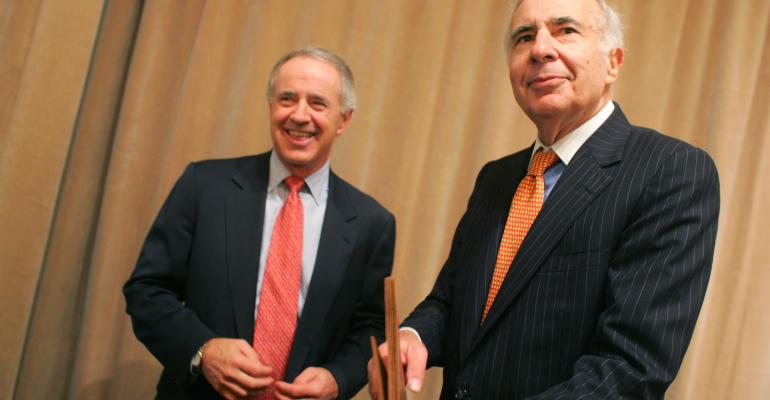By
Carl Icahn’s appointment as a special adviser to President-elect Donald Trump, with the goal of reducing regulatory burdens, draws attention to a real challenge for the federal government. But Icahn won’t be the one to meet it.
Begin with the good news. A serious effort to cut paperwork requirements and eliminate unjustified regulatory costs would produce big dividends. Just this month, the Office of Information and Regulatory Affairs quietly released its annual report quantifying the paperwork burden imposed on the American people by the federal government. (Disclosure: I served as administrator of OIRA from 2009 to 2012.) In 2015, that burden amounted to a whopping 9.78 billion hours -- 3.7 percent more than 2014, and nearly matching the previous high of 9.8 billion hours in 2009.
To be fair, the Barack Obama administration succeeded in cutting hundreds of millions of hours from the total -- but 9.78 billion hours is nuts. Suppose that you took all the residents of Philadelphia, locked them in a huge room, and made every person (man, woman, and child) fill out federal forms for eight hours a day for all of 2017. That wouldn’t get you even halfway.
The financial costs of regulation are also excessive -- although not nearly as high as some people will tell you. (“Under President Obama, America’s business owners have been crippled by over $1 trillion in new regulations,” Icahn was quoted as saying by Trump’s transition team.)
The least-unreliable figures come from the Office of Management and Budget, which finds that on average, new regulations have imposed an annual cost of around $8 billion since 2004. Interestingly, the annual costs haven’t changed much between Republican and Democratic administrations (and that’s true going all the way back to Ronald Reagan).
But over time, the annual number becomes troubling: $80 billion over 10 years can hurt a lot of people. And that figure doesn’t include regulations from independent agencies such as the Securities and Exchange Commission or the Federal Trade Commission, or the occasionally massive burdens imposed by state and local governments. (Have you tried buying a house lately? Or renovating one?)
The Obama administration has worked to eliminate regulatory burdens; its efforts are expected to produce $22 billion in five-year savings. And it’s important to look at the benefits of regulations, not merely their costs. But no one should deny that a massive amount remains to be done to eliminate unjustified requirements, especially if the Trump administration can find a way to ensure to include independent agencies and state and local governments in the burden-reduction effort.
Which brings us to Icahn. The Trump transition team calls him a special adviser -- but without any kind of federal job. According to the announcement, Icahn “will be advising the President in his individual capacity and will not be serving as a federal employee or a Special Government Employee and will not have any specific duties.”
That matters to Icahn’s likely impact, because someone who lacks specific duties, or a federal job, is unlikely to be able to move the federal government in new directions. A few days before, the president-elect chose Representative Mick Mulvaney as director of the Office of Management and Budget, which normally has the lead on regulatory reform -- not least because it includes the Office of Information and Regulatory Affairs. Far more than Icahn, Mulvaney and the person selected to lead OIRA will play leading roles in Trump’s efforts to cut regulations.
That’s a simple reflection of how the executive branch is organized. Civil servants in OMB and OIRA have the institutional capacity and the experience to oversee a serious regulatory reform effort. They are real experts on process, which means that they know exactly how to get things done (including how to reduce the risk of losing in court). They are also experts on substance -- not in the sense that they have all the answers, but they know a great deal about the reasons for and against the decisions that led to those 9.78 billion hours in paperwork, and to that $80 billion in 10-year regulatory costs.
That’s why any serious regulatory reform effort must put a high priority not on special advisers lacking actual jobs, but on an organized process within the Executive Office of the President, with the new administrator of the Office of Information and Regulatory Affairs playing a leadership role. An outside adviser can venture suggestions and ideas, but inevitably, the real work will be done by federal employees with “specific duties.”
If the Trump administration is serious about regulatory reform, it will quickly focus on the priorities of the budget director, on complex institutional details, and on choosing an OIRA administrator who understands how the executive branch works. If you want to know how far regulatory reform will go, that’s what to watch.
Cass R. Sunstein is a Bloomberg View columnist. He is the author of “The World According to Star Wars” and a co-author of “Nudge: Improving Decisions About Health, Wealth and Happiness.”
To contact the author of this story: Cass R Sunstein at [email protected] To contact the editor responsible for this story: Christopher Flavelle at [email protected]

